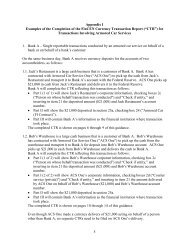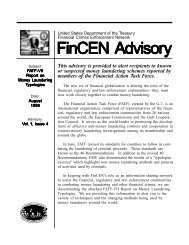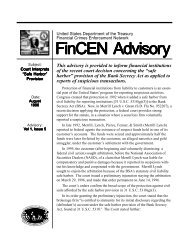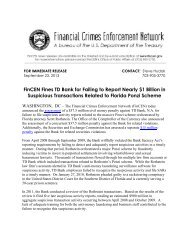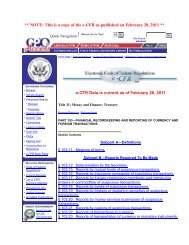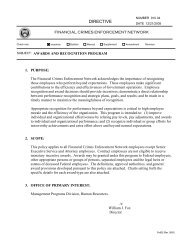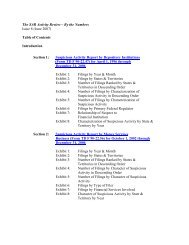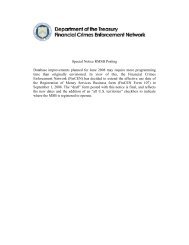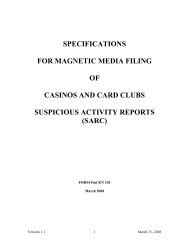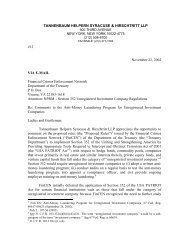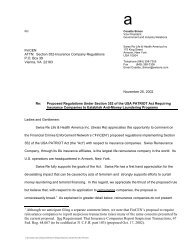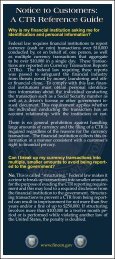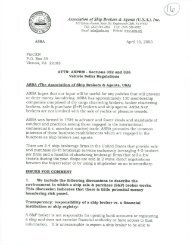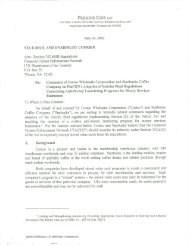The SAR Activity Review Issue 12 - FinCEN
The SAR Activity Review Issue 12 - FinCEN
The SAR Activity Review Issue 12 - FinCEN
You also want an ePaper? Increase the reach of your titles
YUMPU automatically turns print PDFs into web optimized ePapers that Google loves.
2<br />
fact sent to a corporation controlled by the defendant. A <strong>SAR</strong> filed in 2006 reports<br />
the loss on some of the loans that the defendant originated. Also in 2006, a bank<br />
filed a <strong>SAR</strong> alleging that the defendant stole the identity of a woman and used<br />
that information to buy several vehicles.<br />
(Investigating Agency: Federal Bureau of Investigation)<br />
SUSPICIOUS ACTIVITY REPORTS “EXTREMELY HELPFUL” IN<br />
STRUCTURING CONVICTION RELATED TO INTERNATIONAL<br />
LOTTERY SCHEME<br />
In what a federal prosecutor called “the most blatant currency structuring case” he<br />
had seen, a federal judge sentenced an 82-year-old man in March 2007 to 15 months<br />
in prison and ordered him to pay $110,000 in restitution to American victims of an<br />
international lottery scheme. <strong>The</strong> defendant had been involved in several suspicious<br />
investment schemes over the past few years, and numerous <strong>SAR</strong>s document a string<br />
of unusual transactions. In addition, the investigating FBI agent reported that he<br />
would not have been able to make the case without the <strong>SAR</strong>s.<br />
<strong>The</strong> defendant told a U.S. district judge that he regretted his involvement in the<br />
case, which is still being investigated by Canadian law enforcement. Prosecutors<br />
charged that the defendant and his Canadian partners, none of whom have been<br />
apprehended, ran “an online scam” on the Internet involving false enticements<br />
pertinent to the Australian Lottery.<br />
As part of his plea agreement, the defendant admitted that he structured cash<br />
withdrawals from his bank, in amounts less than $10,000, for the purpose of<br />
evading reporting requirements of the BSA. He specifically admitted that he was<br />
aware of the CTR threshold.<br />
<strong>The</strong> defendant claimed to be the intermediary in the scheme. Victims would send<br />
money to him, mostly through wire transfers and personal checks that he deposited<br />
in various accounts, and he would withdraw the money in structured transactions.<br />
With cash in hand, he would purchase money orders to send to the principals in<br />
the scheme. In consideration of the defendant’s age, the assistant U.S. attorney<br />
suggested a term between <strong>12</strong> and 18 months in the U.S. Bureau of Prisons, although<br />
the usual guideline for that crime would be 33 to 41 months. “This is the most<br />
blatant currency structuring case I have ever seen in my career,” the prosecutor<br />
said. “He was attempting to hide from the federal authorities where all this money<br />
was coming from and why he was washing it through his accounts.”<br />
<strong>The</strong> FBI first encountered the defendant in connection with a stolen IRS check<br />
that he cashed. Additionally, his name repeatedly surfaced during pro-active <strong>SAR</strong><br />
searches by the local FBI office.<br />
In fact, the defendant is the subject of numerous <strong>SAR</strong>s filed since 2004. <strong>The</strong>se<br />
records document a trail of fraudulent activity, including an incident where he<br />
attempted to cash a counterfeit check. Through periodic review of the <strong>SAR</strong>s filed



